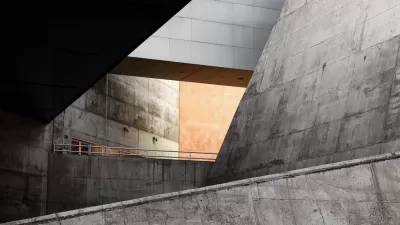“Not that I condone fascism, or any -ism for that matter: -isms in my opinion are not good. A person should not believe in an -ism; he should believe in himself. I quote John Lennon: ‘I don’t believe in Beatles, I just believe in me.’ A good point there. After all, he was the walrus. I could be the walrus. I'd still have to bum rides off of people.” —Ferris Bueller
"Not that I condone fascism, or any -ism for that matter: -isms in my opinion are not good. A person should not believe in an -ism; he should believe in himself. I quote John Lennon: ‘I don't believe in Beatles, I just believe in me.' A good point there. After all, he was the walrus. I could be the walrus. I'd still have to bum rides off of people."
-Ferris Bueller
It just doesn't seem right that I found myself walking the streets of Nashville last week, just steps from the fabulous Country Music Hall of Fame, in a furious rage. Because, thanks to my just-finished planning theory class, I couldn't stop categorizing.
I'd always wanted to go to Nashville. The strum and twang appealed to me, and I like seeing how Southern cities move at a different pace from Northern ones. Everything should've been perfect.
But instead my mind was filled with useless labels, which I couldn't help applying to buildings all around me.
"Hm, that looks rather modernist." "Look at that. Formalism at work." "Man, that style of post-urbanism is just so gauche."
If I were to actually say any of these things out loud, I'd hope some Tennessean would be kind enough to shoot me in the face.
I think I must be missing something. After a semester's worth of planning theory-a required course for planning students in my program-I still honestly don't understand what the point is. You have all of these labels-modern urbanism, postmodern urbanism, post-urbanism, functional urbanism, everyday urbanism, suburban urbanism-which are good for what, exactly? Other than sounding like a Shel Silverstein poem?
It seems foolhardy at best to stick to prescribed models when attacking planning challenges. If I'm solving a problem for a client, they don't care if I'm using the Rational Model, the Incremental Model, the Communicative Model or America's Next Top Model. They just care if I come up with a solution that's affordable, feasible and will get them reelected.
Over the course of the semester, classmates and I argued about the utility of studying these labels. Are they useful-for categorizing, for guiding practice, for establishing blueprints-or does their application expire as soon as we exit the classroom?
As far as I can tell, postmodernism isn't a thing. Modernism isn't a thing. Rather, they're organizing devices. I guess they might come in handy if you want to talk to an academic, and everyone needs to have the same vocabulary. But really, who wants to talk to an academic?
Are we in a postmodern era, or a post-postmodern era? More importantly, what does having a "correct" answer to that question buy you? In every era, there are endless variations and exceptions to the dominant paradigm. Any labels that you study-whether in planning, history, literature or politics-refer to the history of those privileged enough to write it. Just because I'm at a fancy-pants university doesn't mean I want that privilege.
Would it be any better or worse if we planned according to another –ism, like nihilism? Go back to Bueller: "I do have a test today-that wasn't bullshit. It's on European socialism. I mean, really, what's the point? I'm not European. I don't plan on being European. So who gives a crap if they're socialists? They could be fascist anarchists, it still doesn't change the fact that I don't own a car."
Not that I advocate ignorance-is-bliss. Far from it. But it seems to be working out okay for Ferris.

Planetizen Federal Action Tracker
A weekly monitor of how Trump’s orders and actions are impacting planners and planning in America.

Restaurant Patios Were a Pandemic Win — Why Were They so Hard to Keep?
Social distancing requirements and changes in travel patterns prompted cities to pilot new uses for street and sidewalk space. Then it got complicated.

Map: Where Senate Republicans Want to Sell Your Public Lands
For public land advocates, the Senate Republicans’ proposal to sell millions of acres of public land in the West is “the biggest fight of their careers.”

Maui's Vacation Rental Debate Turns Ugly
Verbal attacks, misinformation campaigns and fistfights plague a high-stakes debate to convert thousands of vacation rentals into long-term housing.

San Francisco Suspends Traffic Calming Amidst Record Deaths
Citing “a challenging fiscal landscape,” the city will cease the program on the heels of 42 traffic deaths, including 24 pedestrians.

California Homeless Arrests, Citations Spike After Ruling
An investigation reveals that anti-homeless actions increased up to 500% after Grants Pass v. Johnson — even in cities claiming no policy change.
Urban Design for Planners 1: Software Tools
This six-course series explores essential urban design concepts using open source software and equips planners with the tools they need to participate fully in the urban design process.
Planning for Universal Design
Learn the tools for implementing Universal Design in planning regulations.
Heyer Gruel & Associates PA
JM Goldson LLC
Custer County Colorado
City of Camden Redevelopment Agency
City of Astoria
Transportation Research & Education Center (TREC) at Portland State University
Camden Redevelopment Agency
City of Claremont
Municipality of Princeton (NJ)






























